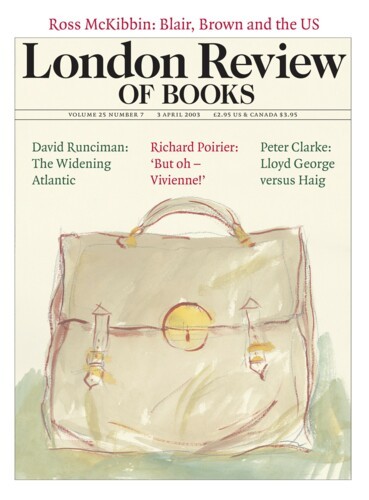One of the oddities about France’s permanent membership of the Security Council is that its instincts are those of an influential player in the General Assembly. This in turn has to do with its skills in what you might call ‘decline management’ – the steady, negotiated passage from imperialism to mere nation status, with Great Power privileges flapping like ragged ensigns in the wind. Disaster taught the postwar French elites a good deal. From Dien Bien Phu through Suez – the only time it exercised its veto against the US – and on to the end in Algeria, France learned better than Britain how to cuts its losses for maximum gain, turning decolonisation into an economic benefit for the old metropolis.
There have been some nasty residual effects. French corporate interests are close to the heart of the current conflict in Côte d’Ivoire. Earlier – it might have been yesterday – there was the chilling francophone zeal that led Mitterrand to back the Rwandan Government during the 1994 genocide (the armed Tutsi opposition in this former Belgian colony had bases in ‘rival’ anglophone Uganda) and the Great Power atavism of a nuclear test in the South Pacific the following year. But the French position on the Iraq war is not another bit of Empire debris. It’s part of the Gaullist foreign policy revision, which was firmly in place within four or five years of Suez and which still makes France good, solid General Assembly material.
Under the Fourth Republic, France and Israel had enjoyed a clandestine love affair. Arms deals, and above all nuclear weapons co-operation, had been conducted away from the eyes of the world, and much to the annoyance of the Quai d’Orsay – official policy should have been dictated by the Tripartite Agreement for regional arms limitation signed with Britain and the US in 1950. On his return to power in 1958, de Gaulle began to shape a new policy, consistent with his misgivings about nuclear co-operation with Israel and informal Franco-Israeli arms deals. The colonial crisis in Algeria had brought him back to centre-stage. Its resolution in 1962 coincided with a foreign policy realignment that won France enormous prestige and favour in the Arab world at the very moment it abandoned colonialism. Five years later, during the Arab-Israeli war of 1967, de Gaulle came down firmly against Israel. (One of his arguments at the time was a foretaste of Robin Cook’s Commons resignation speech: the speed and scale of Israel’s victory proved, to his mind, that the Israelis had exaggerated the Arab military threat, just as, in Cook’s view, it is only ‘because Iraq’s military forces are so weak’ that Bush Jr’s war has been thinkable in the first place.)
The temptation, in the run-up to the Bush war, was to project France’s reluctance for battle as an unscrupulous business-as-usual approach to the Arab world, topped by ingratitude for Allied sacrifice in the two world wars. The Americans have said as much and so has the Blair entourage.
Chirac is not an ‘ethical’ person. Nor was Giscard. Both enjoyed the dividend of de Gaulle’s 1960s policy make-over – an Arab dividend above all. This is what David Styan, in an unpublished thesis on Franco-Iraqi relations, has called the ‘aggressively mercantilist’ phase of Gaullist foreign policy. By the mid-1970s a reactor in Osirak looked no worse than a reactor in Dimona. Chirac was Giscard’s Prime Minister in those days and he got on famously with Saddam, then the Iraqi Vice-President. But France’s dealings with Saddam were applauded as a way of keeping Iraq out of the Soviet camp, and later as a buffer against Khomeinism, by which time 22 countries were selling arms and parts to Iran and Iraq. Saddam’s blueprints for chemical warfare were provided by an American company, according to Said Aburish, who worked for him at the time. Britain’s deals are well known from the Scott Inquiry’s findings of 1996. As for ‘Old Europe’ – ‘good old Europe’, as it once looked to Washington – Saddam’s attack on the Kurds in Halabja involved the use of German nerve gas delivered from French aircraft.
De Gaulle’s mistrust of Nato, his interest in the non-aligned movement, his sympathy with Cuba and his criticism of the American war in Vietnam have a few echoes in Chirac’s take on a second resolution, but they’re very faint. De Gaulle grasped that if France wanted influence in a changing world, it would have to exert it from somewhere in the thick of things: there was no real place any longer on the commanding heights. Paradoxically, it was the very desire for independent Great Power status that had led to this realisation. At the time, the Cold War offered plenty of room for manoeuvre at the margins of superpower enmity. But there is only one superpower now, and it pays to fall in line. The permanent seat that de Gaulle feared was an anachronism has become a high-risk tenure – some would say a liability – for a country that can’t see eye to eye with America.
Send Letters To:
The Editor
London Review of Books,
28 Little Russell Street
London, WC1A 2HN
letters@lrb.co.uk
Please include name, address, and a telephone number.

